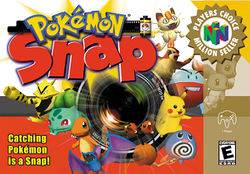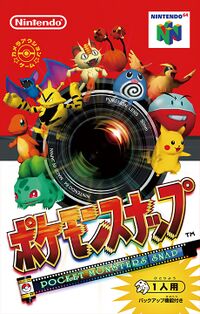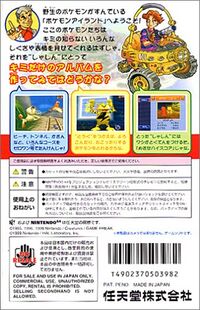Pokémon Snap: Difference between revisions
TeridaxXD001 (talk | contribs) |
ShinySnorlax (talk | contribs) (→Intro) |
||
| Line 29: | Line 29: | ||
'''Pokémon Snap''' (Japanese: '''ポケモンスナップ''' ''Pokémon Snap'') is a [[Spin-off Pokémon games|spin-off]] [[Pokémon games|Pokémon game]] for the [[Nintendo 64]]. | '''Pokémon Snap''' (Japanese: '''ポケモンスナップ''' ''Pokémon Snap'') is a [[Spin-off Pokémon games|spin-off]] [[Pokémon games|Pokémon game]] for the [[Nintendo 64]]. | ||
In Pokémon Snap, the famous Pokémon Researcher | In Pokémon Snap, the famous Pokémon Researcher [[Professor Oak]] is studying Pokémon on [[Pokémon Island]], and invites [[Todd Snap]], a talented young [[photography|photographer]], to assist in his research. The only current inhabitants of Pokémon Island are wild Pokémon, making it the perfect place to study Pokémon in their natural habitat. Whereas a Trainer may not be able to resist catching the wild Pokémon of the island, Todd's photography skills may equally aid in the Professor's research to complete his {{OBP|Pokémon Report|Pokémon Snap}}. | ||
Rather than catching and training Pokémon, the goal is to explore Pokémon Island and photograph its inhabitant Pokémon. Travel is restricted to tracks designed for the [[ZERO-ONE]], and Todd's equipment includes his [[camera]], apples to use as [[Pokémon food]], [[Pester Ball]]s to knock out or stun Pokémon, and a [[Poké Flute]] to wake sleeping Pokémon. Some of these items Todd gains further into his journey, as well as earning the [[Dash Engine]] to increase the speed of the ZERO-ONE. | Rather than catching and training Pokémon, the goal is to explore Pokémon Island and photograph its inhabitant Pokémon. Travel is restricted to tracks designed for the [[ZERO-ONE]], and Todd's equipment includes his [[camera]], apples to use as [[Pokémon food]], [[Pester Ball]]s to knock out or stun Pokémon, and a [[Poké Flute]] to wake sleeping Pokémon. Some of these items Todd gains further into his journey, as well as earning the [[Dash Engine]] to increase the speed of the ZERO-ONE. | ||
Revision as of 00:17, 12 February 2014
- If you were looking for the book based on this game, see Pokémon Snap (book).
| Pokémon Snap ポケモンスナップ | |
|---|---|
 Boxart of Pokémon Snap | |
Basic info
| |
| Platform: | Nintendo 64 |
| Category: | First person rail shooter |
| Players: | 1 |
| Connectivity: | None |
| Developer: | HAL Laboratory |
| Publisher: | Nintendo |
| Part of: | Generation I spin off |
Ratings
| |
| CERO: | A |
| ESRB: | E |
| ACB: | G |
| OFLC: | N/A |
| PEGI: | 3 |
| GRAC: | N/A |
| GSRR: | N/A |
Release dates
| |
| Japan: | March 21, 1999 (N64)[1] December 4, 2007 (Wii VC)[2] |
| North America: | July 30, 1999 (N64)[3] December 10, 2007 (Wii VC)[4] |
| Australia: | March 23, 2000 (N64)[5] December 11, 2007 (Wii VC)[6] |
| Europe: | September 15, 2000 (N64)[7] December 11, 2007 (Wii VC)[8] |
| South Korea: | N/A |
| Hong Kong: | N/A |
| Taiwan: | N/A |
Websites
| |
| Japanese: | Official site |
| English: | Official site |
|
Japanese boxart
| |
Pokémon Snap (Japanese: ポケモンスナップ Pokémon Snap) is a spin-off Pokémon game for the Nintendo 64.
In Pokémon Snap, the famous Pokémon Researcher Professor Oak is studying Pokémon on Pokémon Island, and invites Todd Snap, a talented young photographer, to assist in his research. The only current inhabitants of Pokémon Island are wild Pokémon, making it the perfect place to study Pokémon in their natural habitat. Whereas a Trainer may not be able to resist catching the wild Pokémon of the island, Todd's photography skills may equally aid in the Professor's research to complete his Pokémon Report.
Rather than catching and training Pokémon, the goal is to explore Pokémon Island and photograph its inhabitant Pokémon. Travel is restricted to tracks designed for the ZERO-ONE, and Todd's equipment includes his camera, apples to use as Pokémon food, Pester Balls to knock out or stun Pokémon, and a Poké Flute to wake sleeping Pokémon. Some of these items Todd gains further into his journey, as well as earning the Dash Engine to increase the speed of the ZERO-ONE.
Blurb
Professor Oak needs your help!
Professor Oak has asked you to capture the Wild Pokémon of Pokémon Island on film! Tour the Island in your ZERO-ONE vehicle and snap pictures of Pokémon in their natural habitat. Wild Pokémon are often camera-shy, so you'll have to use special items to bring them out in the open. Only the best shots will do for Professor's Pokémon Report so sharpen your photography skills and get ready to SNAP!
- The first-ever N64 game to feature the world-famous Pokémon - fully rendered in 3-D!
- Explore the many environments of Pokémon Island, like the sunny beach, the mysterious caves, and even a red-hot volcano!
- Many different types of Pokémon inhabit the island. See how many you can catch on film!
- Print your photos as stickers at Pokémon Snap Stations! Visit www.Pokémon.com or call 1-800-859-4521 for all the details and to find the nearest Snap Station nearest you!
Characters
Locations
Pokémon
63 species of Pokémon appear in this game:
Pokémon Signs
Six Pokémon appear in the form of a Pokémon sign.
Sticker Stations
For a period of time after Snap's launch, Pokémon Snap Sticker Stations were available at Blockbuster, which would print out stickers of pictures which were taken in the game for three dollars. There was also a mode in Pokémon Stadium which would take and save pictures of Pokémon and print them out at the Stations.
Wii Virtual Console release
Pokémon Snap was re-released for the Wii's Virtual Console on December 4, 2007 in Japan, December 10, 2007 in the US, December 11, 2007 in Europe, and December 14, 2007 in Australia. This version can upload pictures from the game to the Wii's Message Board, where they can be transferred to people on the Wii's Address Book.
In this rerelease, Jynx were recolored purple from the black they were in the original game, to reflect the changes in its design.
To celebrate this re-release, the Japanese Yahoo! Kids Pokémon page streamed all of the episodes in which Todd Snap appeared from December 14, 2007 to January 14, 2008.[9]
Reception
Fans were disappointed by the small number of courses, along with the fact that only 63 of the original 151 Pokémon were included. Despite this, the game received good reviews in the media, scoring a 7.8 on IGN, an 8.0 on GameSpot, and a 77 on Metacritic.
Trivia
- This game is one of two games that show Magnemite's evolution that is true to the Pokédex (the other being Pokémon Mystery Dungeon). In Pokémon Snap, in order to evolve Magnemite, three Magnemite have to be gathered. This differs from the RPG Pokémon games and the anime, where three individual Magnemite are not needed. Ironically, this game also shows a form of Magneton that is not touched on in the anime. In the anime, Magneton is always seen in a connected triangle pattern. In Pokémon Snap, Magneton is seen as three Magnemite floating by themselves, totally unconnected, but in a perfect triangle.
- Even though legendary Pokémon cannot be bred (at least, not in a breeding center), it is clearly shown that Articuno, Zapdos, and Moltres are in eggs, which shows they were bred in some sort of way.
- Magikarp can be found in every course in the game (with the exception of Rainbow Cloud).
- Despite being a Nintendo 64 title, only 63 of the then 151 Pokémon are in this game. Ekans can be seen in pre-release screenshots, indicating the number may have been 64 at some point in development.
- Also, a few Pokémon were included without their evolved forms, most notably Pikachu.
- This game was adapted into a novel for the Pathways to Adventure series.
- Although the game features voice acting from the TV series, certain Pokémon that were given new voices for the dub still have their original Japanese voice acting in the game. These include Metapod, Diglett, Dugtrio, Psyduck and Porygon who, at the time of the game's release, did not have a dub voice.
- Originally, the game that would become Pokémon Snap was not a Pokémon game. Nintendo President Satoru Iwata himself mentioned that the game was originally "a normal game in which you took photos, but the motivation for playing the game wasn't clear." It wasn't until they introduced Pokémon into the game that HAL's Masanobu Yamamoto thought they had a clarified direction. "That time, adopting the Pokémon world clarified what we should do and the direction we should head, and I came to like Pokémon, so I felt like that had saved us."[10]
- In the River course, Shellder are shown to be capable of levitating, an ability that is not demonstrated by them in any other media.
References
- ↑ Pokémon.co.jp - Pokémon Snap (N64)
- ↑ Pokémon.co.jp - Pokémon Snap (VC)
- ↑ Pokémon.com (US)
- ↑ Nintendo Pressroom (requires login)
- ↑ Nintendo Australia (archive)
- ↑ Nintendo Australia - News (archive)
- ↑ Pokémon.com (UK)
- ↑ PEGI
- ↑ [1]
- ↑ Iwata Asks

|
This game-related article is part of Project Games, a Bulbapedia project that aims to write comprehensive articles on the Pokémon games. |



